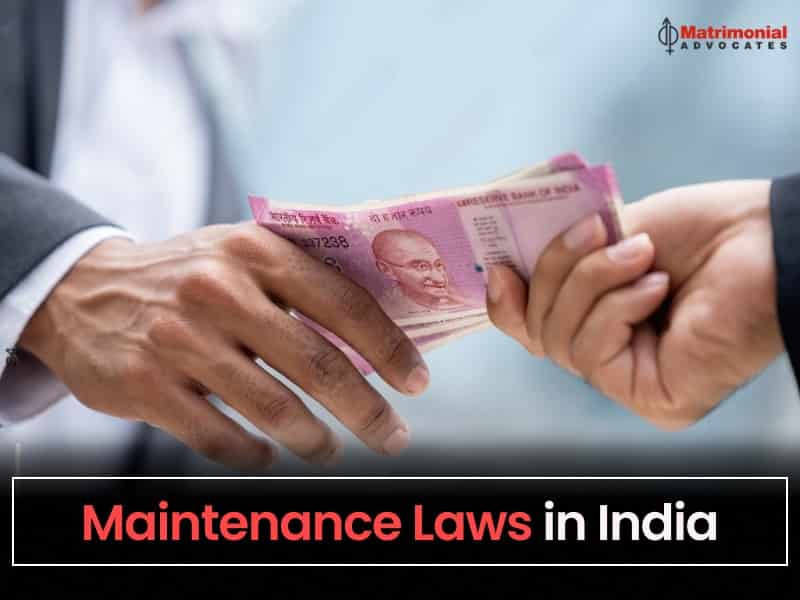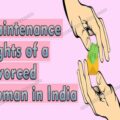
Maintenance is defined under section 3(b) of the Hindi Adoption and Maintenance Act, 1956.
- To provide basic amenities like food, clothing, residence, educations, medical attendance and treatment etc.
- In case of unmarried daughter, father bear the expenses of her marriage.
- To give dependent spouses and children financial assistance.
- Woman is permitted to request maintenance from husband to cover the living expenses of wife and the children.
- The courts have recognized the right of maintenance of a working woman and held that an estranged woman can claim maintenance from her husband even she earns a monthly income, which is not enough for her to maintain herself.
Factors affecting the right of Maintenance Laws in India
- The relationship of the husband and wife should be proved
- She must be unable to maintain herself
- The husband must be having sufficient means and it should be proved that the husband has neglected or has refused to maintain a wife
- Even a wife who has been divorced is entitled to claim maintenance from her
- The husband provided that she has not re-married.
Provisions of Maintenance Laws in India
Under Hindu Law
Hindu Marriage Act, 1955:
- Section 24 of the Hindu Marriage Act, 1955, clearly defines where in any proceedings under this at act (interim or temporary) it appears to the court that either the wife or the husband, as the case may be, has no independent income insufficient for her or his support and the necessary expenses of the proceedings.
- The Hindu law or family law in India recognizes the right of a wife, children, aged parents and widowed daughter or daughter in law to receive maintenance.
- The act reclines certain situations in which it may become impossible for a wife to continue to reside and cohabit with the husband but she may not want to break the matrimonial tie for various reasons ranging from growing children to social stigma.
- The court will consider the financial position of the husband and reasons for which the wife is separated from her husband, before awarding maintenance to her.
- Section 25 of the Hindu Marriage Act, 1955, defines about the permanent and alimony.
Hindu Adoption and Maintenance Act, 1956:
The wife is entitled to maintenance under section 18(2) of the act, it provides a list of conditions when she can apply to get maintained under this section. And clause 3 of the latter states the conditions when she is entitled to get an order of maintenance. Child and aged parents are entitled to get a sum for survival under section 20 of the Act.
Under Muslim Law
Maintenance of wife under Muslim Law which is also known as Nafqah has been provided under the Muslim Women (Protection of Rights on Divorce) Act, 1986. The Muslim woman is entitled for maintenance in the following cases:
- During the iddat period, reasonable and fair maintenance has to be paid to the wife. Mehr agreed at the time of marriage has to be given back.
- When the woman had to maintain herself and her children, maintenance has to be paid for a period of 2 years. If the child is born after the divorce, then the 2 years period begins from the child’s date of birth.
- All property was given to her by her relatives, friends or husband before, at the time or after.
The Muslim Women (Protection of Rights on Divorce) Act, 1986, has now made the operation of section 125-128 of the Criminal Procedure Code optional in respect of Muslim woman.
In Danial Latifi and Others v. Union of India AIR 2001SSC 958 all the writ petitioners challenging the constitutional validity of the Muslim Woman Act, 1986 were clubbed together in this P.I.L. under article 32 of the Constitution of India. The writ petition was dismissed by the Supreme Court challenging the validity of Muslim Woman Act, 1986.
Children- Both Boy and Girl
Under Muslim law, the father has to maintain his son only until he attains majority. When he has to maintain his daughter until her marriage and till the time she goes to her husband’s home. Under this law, the father is not under the duty to maintain the illegitimate child.
Parents and Grandparents
It is obligatory upon a man to provide maintenance for his father, mother and grandparents if they happen to be in circumstances necessitating it. The fact that they may belong to different religions makes no difference.
Parents and children are jointly liable for a person’s maintenance. Thus, if a man has both father and a son who are poor, the liability falls equally upon them. The grand-children of a person would not be liable to maintain if there is a husband, children or parents who would be under a duty to maintain.
Thus, if a man has a daughter or father and a son’s son, the daughter or the father must maintain. The son’s son would not be bound to maintain even though he is entitled to inherit.
Under Parsi Law
Parsi Marriage Act, 1936
- The Parsi Marriage and Divorce Act, 1936 gives the right to maintenance to a Parsi woman. The court can award a maximum of one-fifth of the husband’s net income as maintenance.
- Section 40 the act defines the concept of permanent alimony and maintenance that at the time of passing a decree by the court that the defendant shall pay to the plaintiff for her or his maintenance and support, such gross sum or monthly or periodical sum.
- The husband is liable to pay maintenance to the wife for her lifetime only if she remains unmarried and chaste after the divorce process.
- The court consider factors like the husband’s capability to pay, property, and other assets owned by the wife and the personal conduct of the husband and wife.
- Under this act, if the party in whose favour, an order has been passed if such party is the wife, that she has not remained chaste, or if such party is the husband, that he had sexual intercourse with any women outside wedlock, it may vary, modify or rescind any such order in such manner as the court may deem just.
Under Christian Law
Indian Divorce Act, 1869
The Indian Divorce Act, 1869, governs the maintenance rights of a Christian wife. Under section 37 of the Indian Divorce Act, 1869 she can apply for maintenance in a Civil Court or High Court. The husband will be liable to pay maintenance for her lifetime.
Section 36 of Indian Divorce Act, 1869, defines alimony pendente lite, whether it be instituted by a husband or a wife, and whether or not she has obtained an order of protection that wife may present a petition for alimony pending the suit. Then on court being satisfied of the truth of the statements therein contained, may make such order on the husband for payment to the wife of alimony pending the suit as it may deem just, that the suit shall in no case exceed one fifth of the husband’s average net income for the three years next preceding the date of order.
Section 37 of the Indian Divorce Act, 1869, defines power to order permanent alimony that the husband shall, to the satisfaction of the court, secure to the wife such gross sum of money, or such annual sum of money for any term not exceeding her own life, to the ability of the husband and to the conduct of the parties, if thinks reasonable may cause a proper instrument to be executed by all necessary parties.
Section 38 of the Indian Divorce Act,1869 defines that court may direct the same to be paid either the wife herself or to any trustee on her behalf to be approved by the court and may impose any terms or restrictions which to the court seem expedient and may from time to time appoint a new trustee, if it appears to the court convenient to do so.
Under Secular Law
Under Code of Criminal Procedure,1973
Under section 125 of the Code of Criminal Procedure, 1973 the right of maintenance under the family law in India, extends not only to the wife and dependent children but also to indigent parents and divorced wives. The maintenance claim depends upon the husband’s capability to provide sufficient means.
On November 4th 2020, a division bench of the Supreme Court consisting of Indu Malhotra and Subhash Reddy JJ in Rajnesh v Neha, it held that maintenance in all cases will be awarded from the date of filing the application for the maintenance before the concerned court. For execution of the orders of maintenance, an order or decree of maintenance may be enforced under section 28A of the Hindu Marriage Act, 1956; Section 20(6) of the Domestic Violence Act; and Section 128 of Cr.Pc. as may be applicable.
The supreme court further directed in the judgement the criteria for determining the quantum of maintenance and provided the following factors to be considered by the court:
- The status of the parties
- Reasonable wants of the claimants
- The claimant’s independent income and property
- The number of persons the non-applicant has to maintain
- The amount should aid the applicant to live in a similar lifestyle as he/she enjoyed in the matrimonial house
- Non-applicant’s liabilities, if any
- Provision for food, clothing, shelter. Education, medical attendance and treatment
- Payment capacity of the non-applicant
- When all or the income sources are not reported, some guesswork is not ruled out when assessing the income of the non-applicant
Under Special Marriage Act,1954:
Section 36 of Special Marriage Act, 1954, Alimony pendente lite defines that it appears to the district courts that the wife has not independent income sufficient for her support and the necessary expenses of the proceedings.
On the application of the wife, the court order the husband to pay her the expenses of the proceedings, and weekly and monthly during the proceedings such sum as having regard to the husband’s income.
Section 37 of Special Marriage Act, 1954, permanent and maintenance defines that at time of passing any order or at any subsequent to the decree, by a charge of husband’s property such gross sum or such monthly or periodical payment of money for a term not exceeding her life, as regard to her own property.





